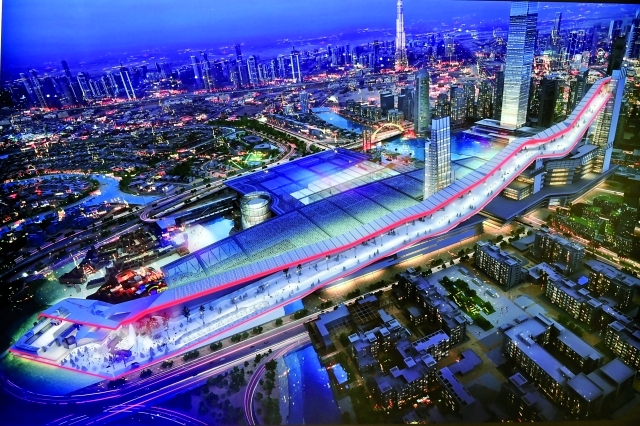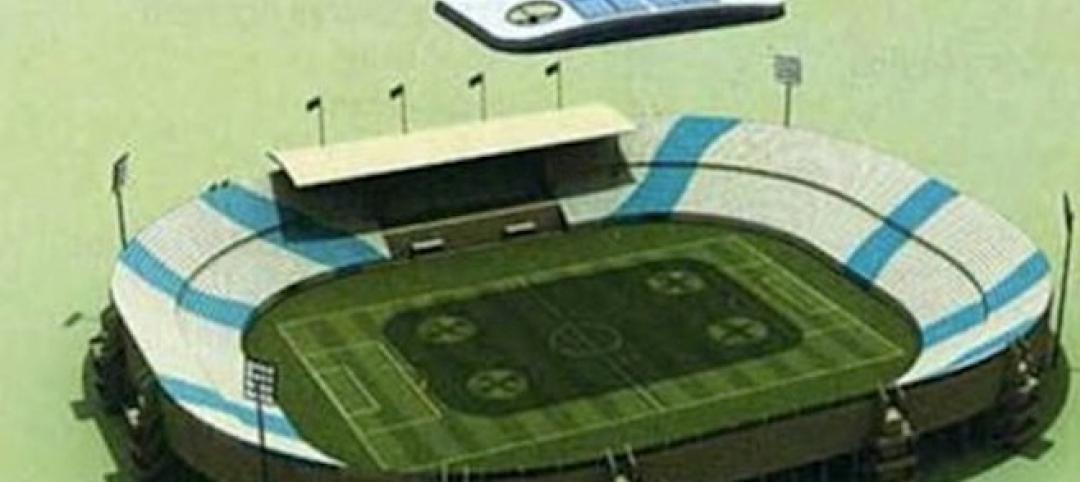The words “skiing” and “desert” aren’t often used in the same sentence. But that’s changing in Dubai, which appears to be on a mission to have the “biggest” of everything, including extravagant shopping malls, towers, and, now, ski slopes.
Gulf News reports that the oil-rich country is planning a project that will cover 3.67 million sm (39.5 million sf) and include a shopping mall, civic plaza, a 4-kilometer canal, a marina with 100 boat slots, and what’s being touted as the world’s longest indoor ski slope.
The developer, Meydan City Corporation, states that this project should be completed before 2020, the year that Dubai hosts the World Expo 2020. While the developer didn’t disclose what this project might cost, The Guardian reports estimates of up to 25 billion dirhams (about $6.8 billion).
The Dubai newspaper Al-Bayan reports that this project would extend from the Meydan racetrack to Burj Khalifa, the world’s tallest tower.
The shopping mall component of this project, called Meydan One Mall, alone will cover 25,000 sm (269,000 sf), and include a retractable roof measuring 150 x 80 meters. The mall will be adjacent to the 1.2-kilometer (4,922-foot) long ski slope. (The Emirate already holds the record for the largest indoor ski slope, at 400 meters long, which runs year-round inside the Mall of the Emirates, according to The Guardian.)
At the base of the ski slope will be 25,000-sm Meydan Arena, which will seat up to 8,000 people, and could be used for a variety of sporting contests and live shows.
This project also includes the construction of The Dubai One, a 711-sm-tall building that would be the tallest residential tower in the world. It will have 885 apartments and a five-star hotel with 350 rooms, as well as a conference center, a 655-meter observation deck, and skytop restaurant.
Residents and visitors will be able to avail themselves of more than 5.3 kilometers of bicycle and hogging trails, a 300-meter-long beach, and a heritage village that could house up to 78,000 people. The project will also feature a 420-meter-long “dancing” fountain, also said to be the world’s largest.

Related Stories
| Sep 30, 2011
Design your own floor program
Program allows users to choose from a variety of flooring and line accent colors to create unique floor designs to complement any athletic facility.
| Sep 16, 2011
Largest solar installation completed at Redskins' football stadium
On game days, solar power can provide up to 20% of FedExField’s power.
| Sep 12, 2011
First phase of plan to revitalize Florida's Hialeah Park announced
This is the first project of a master plan developed to revive the historic racetrack.
| May 25, 2011
Olympic site spurs green building movement in UK
London's environmentally friendly 2012 Olympic venues are fuelling a green building movement in Britain.
| Apr 11, 2011
Wind turbines to generate power for new UNT football stadium
The University of North Texas has received a $2 million grant from the State Energy Conservation Office to install three wind turbines that will feed the electrical grid and provide power to UNT’s new football stadium.
| Apr 5, 2011
U.S. sports industry leads charge in meeting environmental challenges
The U.S. sports industry generates $414 billion annually. The amount of energy being consumed is not often thought of by fans when heading to the stadium or ballpark, but these stadiums, parks, and arenas use massive quantities of energy. Now sports leagues in North America are making a play to curb the waste and score environmental gains.
| Mar 25, 2011
Qatar World Cup may feature carbon-fiber ‘clouds’
Engineers at Qatar University’s Department of Mechanical and Industrial Engineering are busy developing what they believe could act as artificial “clouds,” man-made saucer-type structures suspended over a given soccer stadium, working to shield tens of thousands of spectators from suffocating summer temperatures that regularly top 115 degrees Fahrenheit.
| Mar 11, 2011
University of Oregon scores with new $227 million basketball arena
The University of Oregon’s Matthew Knight Arena opened January 13 with a men’s basketball game against USC where the Ducks beat the Trojans, 68-62. The $227 million arena, which replaces the school’s 84-year-old McArthur Court, has a seating bowl pitched at 36 degrees to replicate the close-to-the-action feel of the smaller arena it replaced, although this new one accommodates 12,364 fans.














